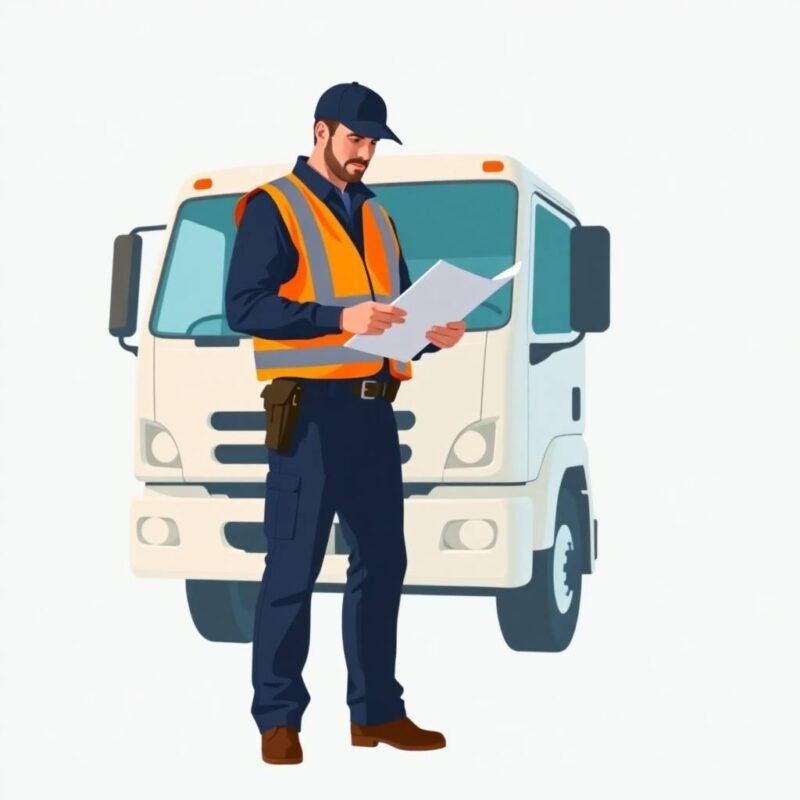1. Ignoring Driver Qualification Files: A Silent Compliance Killer
For small fleet operators, maintaining DOT Compliance for Small Fleets is essential not only for avoiding penalties but for keeping operations safe and sustainable. One of the most overlooked and dangerous areas of non-compliance is the failure to maintain complete and accurate Driver Qualification (DQ) Files. While the focus often falls on ELD logs or drug testing programs, neglecting DQ files can quietly but quickly derail your entire business.
Why DQ Files Matter in DOT Compliance for Small Fleets
Driver Qualification Files are required by the FMCSA for every commercial driver operating under a DOT number. These files include crucial documentation such as driving records, employment history, medical certificates, and ongoing safety performance evaluations. Failing to properly maintain these files can result in violations during audits or roadside inspections, directly impacting DOT Compliance for Small Fleets.
To understand how these files factor into your overall compliance health, review our full driver qualification file requirements and ensure you’re meeting every mandate.
The Hidden Risks of Incomplete or Outdated DQ Files
Many fleet owners assume DQ files are a one-time paperwork task. In reality, they must be updated regularly. Failing to maintain current information opens the door to costly DQ file violations, especially during a DOT audit.
Small fleets, in particular, often lack dedicated compliance staff, making it easier for these files to slip through the cracks. That’s why our DOT audit preparation services are designed specifically to help fleet owners identify and correct file discrepancies before regulators do.
Strengthening DOT Compliance for Small Fleets Through Monitoring
DOT Compliance for Small Fleets isn’t just about staying on the right side of the law—it’s about minimizing operational risk. By using our driver safety score management and compliance checklist tools, fleet owners can stay proactive, not reactive.
Compliance also extends to related areas, including drug and alcohol testing management, CSA scores, and pre-employment testing. Integrating all these components into a single strategy is key to achieving lasting DOT Compliance for Small Fleets.
Resources to Avoid the Silent Killers of Compliance
Neglecting DQ files can lead to violations, legal issues, and even the shutdown of your fleet. To prevent this, you can start by scheduling a consultation through our online appointment portal for a personalized compliance review.
For ongoing support, we provide a variety of services, including IFTA, IRP, and BOC-3 support, how to correct FMCSA violations, and UCR filing assistance. Explore our full library of compliance resources and visit the main blog for current updates.
To ensure full regulatory alignment, consult authoritative sites like Transportation.gov and stay aware of updates to the FMCSA Safety Measurement System (SMS).
Conclusion
DOT Compliance for Small Fleets hinges on consistent and accurate recordkeeping—especially when it comes to DQ files. This silent compliance killer can devastate your fleet’s safety score and financial standing if left unaddressed. Be proactive with your compliance efforts and take full advantage of our FMCSA services for owner-operators and small fleets alike.
For legal clarity, please review our full Disclaimer and Terms of Service.

2. Neglecting Drug and Alcohol Testing Programs: A Legal Minefield
For owners and operators managing small fleets, the importance of maintaining DOT Compliance for Small Fleets cannot be overstated. Among the most crucial—but often overlooked—elements of compliance is a properly managed drug and alcohol testing program. Neglecting this responsibility can lead to devastating legal, operational, and financial consequences.
The Critical Role of Testing in DOT Compliance for Small Fleets
Every CDL driver operating under a DOT number is subject to federally mandated drug and alcohol testing. These requirements are clearly outlined by the FMCSA and are enforced through audits and roadside inspections. For small fleets, failing to comply with these rules can quickly turn into a legal minefield.
To understand your obligations and avoid penalties, review our comprehensive guide on drug and alcohol testing compliance. It’s a must-read for small fleet managers looking to strengthen their DOT Compliance for Small Fleets strategy.
The Legal Risks of Neglect
Small fleets may struggle to keep up with program requirements such as random drug testing, pre-employment testing, and maintaining an active driver drug and alcohol testing program. Neglecting even one component can result in severe fines, liability in the event of an accident, and even license suspension.
For ongoing compliance support, explore our drug and alcohol testing management service to ensure your small fleet remains compliant and audit-ready.
FMCSA Clearinghouse: A Vital Component
As part of DOT Compliance for Small Fleets, carriers must also register with and regularly query the FMCSA Clearinghouse. This database tracks drivers’ drug and alcohol violations and helps ensure that no disqualified driver slips through the cracks.
Many small fleet operators remain unaware of their ongoing obligations within the Clearinghouse. Our dedicated FMCSA compliance support services can help bridge that gap and protect your company from avoidable errors.
Integrating Compliance with Safety and Performance
Drug and alcohol testing doesn’t exist in a vacuum. It ties directly into safety ratings, insurance premiums, and operational credibility. To improve your overall compliance posture, leverage our tools such as the DOT compliance checklist for owner-operators, driver safety score management, and CSA intervention thresholds monitoring.
Additional resources like new entrant safety audit preparation and how to correct FMCSA violations are especially beneficial for small fleets navigating the complexities of compliance.
A Roadmap to Safer, Smarter Compliance
If you’re feeling overwhelmed, you’re not alone. That’s why we invite fleet owners to schedule a personalized consultation to discuss your specific compliance needs.
You can also stay updated with the latest regulatory changes and expert insights by visiting the Truckers Compliance Hub blog. We regularly publish content on related topics such as DOT audit preparation, DQ file violations, and FMCSA compliance requirements.
For complete regulatory guidelines, visit Transportation.gov and ensure you’re aligned with national standards for DOT Compliance for Small Fleets.
Final Thoughts
Neglecting your drug and alcohol testing program is more than a misstep—it’s a direct path to liability, violations, and loss of operating authority. By prioritizing this essential aspect of DOT Compliance for Small Fleets, you not only protect your business but build a foundation for long-term success.
Explore more FMCSA compliance help for trucking companies and view our full terms of service and disclaimer to understand how we support your compliance journey.

3. Skipping Regular Maintenance and Inspections: A Shortcut to Out-of-Service Orders
For small fleet operators, maintaining DOT Compliance for Small Fleets is not just about meeting regulations—it’s about ensuring operational longevity and avoiding costly shutdowns. One of the most overlooked components of compliance is regular vehicle maintenance and inspections. Skipping this vital step is a direct path to violations, out-of-service orders, and damaged CSA scores.
Why Maintenance Matters in DOT Compliance for Small Fleets
Every commercial vehicle must meet strict safety standards as mandated by the FMCSA and U.S. Department of Transportation. Failure to perform regular maintenance and document inspections can lead to severe penalties or even roadside shutdowns. For small fleets, these interruptions can cause irreparable damage to business reputation and customer trust.
To help fleet operators avoid these pitfalls, our DOT Compliance Checklist outlines the critical tasks and documentation required to maintain a compliant fleet.
The Hidden Risks of Deferred Maintenance
Neglecting maintenance isn’t just a mechanical issue—it’s a regulatory violation. Minor mechanical failures such as worn brakes, faulty lights, or tire defects can result in out-of-service orders that halt operations immediately. For many small fleets, these delays also impact customer contracts, leading to lost revenue.
Our service on driver safety score management ensures that your fleet maintains favorable safety metrics and prevents triggers for audits or roadside interventions.
Inspections and Documentation: A Regulatory Priority
Both pre-trip and periodic inspections are mandated as part of DOT Compliance for Small Fleets. Yet many small carriers fail to maintain adequate documentation, leaving them vulnerable during audits. We cover these issues in detail in our post on FMCSA compliance mistakes and DOT audit preparation strategies.
For newer carriers, our new entrant safety audit survival tips provide a step-by-step roadmap to pass inspections and stay compliant from the start.
Strengthening Compliance Through Preventive Action
DOT inspections don’t happen in isolation. Inspectors often cross-check maintenance records with other compliance areas like driver qualification files, drug and alcohol testing programs, and FMCSA Clearinghouse participation. Discrepancies in one area can flag your entire operation.
We recommend using our DOT compliance checklist for owner-operators to unify compliance procedures, including regular maintenance logs, inspection records, and component tracking.
Protecting Your Fleet and Your Business
For comprehensive support with DOT Compliance for Small Fleets, our services like how to correct FMCSA violations, UCR filing assistance, and IFTA, IRP, and BOC-3 support help you stay ahead of compliance challenges.
You can also view past and current compliance tips on the Truckers Compliance Hub blog and schedule a 1-on-1 compliance consultation to get personalized guidance tailored to your fleet’s needs.
Resources to Stay Compliant
Our platform offers detailed insights into the FMCSA Safety Measurement System, CSA intervention thresholds, and regulatory checklists designed for small fleets. Additionally, our resources for owner-operator compliance services are ideal for those seeking ongoing support.
Explore more at FMCSA compliance help for trucking companies and compliance services tailored for small operations.
To understand our content usage, please review our Disclaimer and Terms of Service.
Maintaining DOT Compliance for Small Fleets is a continuous effort—but it begins with the basics: regular maintenance and inspections. Don’t take shortcuts. Prioritize compliance to protect your business from unnecessary downtime and enforcement actions.

4. Improper ELD Usage: Violating Hours of Service Rules Without Realizing It
For small fleet operators, DOT Compliance for Small Fleets is a constant balancing act of maintaining schedules, managing drivers, and meeting federal regulations. One of the most common yet overlooked compliance issues today is improper use of Electronic Logging Devices (ELDs). Many carriers unknowingly violate Hours of Service (HOS) rules due to misconfigured devices, poor training, or simple user errors—exposing themselves to fines, audits, and operational shutdowns.
The Hidden Risk in Your Cab
ELDs are intended to simplify HOS tracking and improve DOT Compliance for Small Fleets, but misuse can result in automatic violations. From incorrect duty status entries to system malfunctions, even a small oversight can trigger red flags during a DOT audit or roadside inspection.
To avoid these errors, carriers should follow a robust DOT compliance checklist that includes ongoing ELD training and periodic log reviews. It’s not enough to install a device—you need to ensure every driver knows how to use it correctly and consistently.
FMCSA and Transportation Regulations
According to the Federal Motor Carrier Safety Administration (FMCSA), all motor carriers are required to monitor driver logs for accuracy and completeness. Violations such as falsifying logs or exceeding driving limits—even unintentionally—can lead to severe consequences. You can reference official guidance through the U.S. Department of Transportation.
Improper ELD usage also affects your FMCSA Safety Measurement System (SMS) scores, making your fleet a target for inspections or compliance reviews.
Common ELD Compliance Mistakes
Errors in log edits, driving time reclassification, or failure to certify logs are all frequent mistakes that violate HOS rules. These are often cited in FMCSA compliance reviews and lead to unnecessary CSA intervention thresholds. Learn more about FMCSA compliance mistakes that could be undermining your business.
Our driver safety score management services help fleet owners identify and correct logbook issues before they result in violations or penalties.
Strengthening Your Fleet’s Compliance
DOT Compliance for Small Fleets requires more than just reactive fixes—it calls for a proactive, structured approach. That’s why we offer DOT audit preparation, driver qualification file support, and drug and alcohol testing management to ensure your entire operation is audit-ready.
Resources like our posts on driver drug and alcohol testing programs, pre-employment drug testing, and random testing requirements provide the additional context needed to stay fully compliant.
If your fleet is just starting out, explore our new entrant safety audit survival tips to understand how to integrate ELD management into your compliance program from day one.
Get Expert Support Today
Staying compliant in today’s regulatory environment is challenging, especially for small operations. Our services such as how to correct FMCSA violations, UCR filings, and IFTA/IRP/BOC-3 support are tailored to simplify the process.
Ready for a compliance check-up? Schedule your consultation now to receive personalized guidance.
For additional resources, explore FMCSA compliance services for owner-operators, compliance help for trucking companies, or the full range of topics on our blog.
Please review our Disclaimer and Terms of Service for information on content use.
Don’t let simple ELD mistakes jeopardize your business. Mastering proper device usage is essential to maintaining DOT Compliance for Small Fleets and keeping your trucks rolling legally and safely.

5. Failure to Monitor CSA Scores: Letting Small Issues Snowball
For motor carriers, especially those operating small fleets, DOT Compliance for Small Fleets isn’t just a best practice—it’s a business imperative. One of the most overlooked aspects of maintaining compliance is the continuous monitoring of your CSA (Compliance, Safety, Accountability) scores. Ignoring your CSA scores is like ignoring your check engine light; the longer you wait, the worse—and more expensive—the problem becomes.
What Are CSA Scores and Why Do They Matter?
CSA scores, tracked through the FMCSA’s Safety Measurement System (SMS), are used by the Federal Motor Carrier Safety Administration to assess the safety performance of motor carriers. These scores impact everything from DOT audits to insurance rates, and even your ability to retain contracts. For owner-operators and small fleets, a poor CSA score can be devastating.
Many small carriers fail to realize that DOT Compliance for Small Fleets includes consistent monitoring of these metrics. Issues such as driver qualification file violations, DQ file errors, and drug and alcohol testing compliance can slowly add up, triggering interventions or out-of-service orders.
The Snowball Effect of Inattention
Missing a few inspections or failing to address minor infractions might not seem like a big deal initially. But those small violations can snowball quickly, especially if you’re not regularly checking your CSA scores. FMCSA compliance mistakes often stem from inattention to detail and a lack of consistent monitoring.
That’s why DOT Compliance for Small Fleets must include not only proper recordkeeping and training but also tools for score management. Services like driver safety score management are essential in helping small carriers avoid costly penalties.
Proactive Measures to Stay Ahead
Staying ahead of potential issues requires more than reactive fixes. Implementing a DOT compliance checklist and ensuring pre-employment drug testing is done properly are key steps toward sustainable compliance. Regular random drug testing and a clear driver drug and alcohol testing program help demonstrate due diligence during audits or roadside inspections.
If your scores have already taken a hit, explore how to correct FMCSA violations and avoid further damage. We also offer CSA intervention threshold support to help you understand and address triggers before they escalate.
Trusted Resources for Small Fleets
Our comprehensive services, including DOT audit preparation, IFTA/IRP/BOC-3 support, and UCR filing deadlines, are built specifically with small fleet operators in mind. If you’re new to the industry, our new entrant safety audit survival tips are a must-read.
Browse our latest posts for up-to-date insights or check out our in-depth resources on FMCSA Clearinghouse compliance and FMCSA compliance requirements for trucking companies.
Get Personalized Help Today
Struggling with CSA monitoring or just need to review your compliance practices? Schedule a one-on-one consultation to discuss how we can tailor our support to your operation.
Also, explore our specialized services for small fleets and owner-operators:
- FMCSA compliance help for trucking companies
- FMCSA compliance services for owner-operators
- Owner-operator DOT compliance checklist
For terms of use and legal disclaimers, please review our Disclaimer and Terms of Service.
Small issues can lead to big problems. Prioritize DOT Compliance for Small Fleets and stop your CSA scores from snowballing into regulatory nightmares.

6. Inadequate Recordkeeping: When Poor Documentation Equals Noncompliance
When it comes to DOT Compliance for Small Fleets, the smallest oversight can quickly lead to significant consequences. One of the most common—and costly—mistakes made by small fleet operators is inadequate recordkeeping. While the trucks may be running smoothly on the road, disorganized or missing documentation behind the scenes can derail a business in an instant.
Why Recordkeeping Is Critical
The Federal Motor Carrier Safety Administration (FMCSA) requires extensive documentation across a variety of areas: hours of service, driver qualification files, vehicle maintenance, drug and alcohol testing, and more. Failure to maintain accurate records often results in violations during audits or inspections. For fleets aiming to uphold DOT Compliance for Small Fleets, documentation isn’t optional—it’s foundational.
For example, improper management of driver qualification file requirements or errors in DQ file documentation can quickly escalate to noncompliance. Similarly, failing to retain proof of participation in a driver drug and alcohol testing program or neglecting random DOT drug testing requirements can lead to serious penalties.
The Domino Effect of Poor Records
In the realm of DOT Compliance for Small Fleets, poor recordkeeping doesn’t just result in a citation—it often triggers a chain reaction. A missed inspection date or expired license can impact your CSA scores, hurt your reputation, and even suspend your operating authority. Errors caught during a DOT audit preparation can snowball into shutdowns or intervention if not corrected.
If you’ve already encountered compliance issues, our resource on how to correct FMCSA violations provides step-by-step guidance to recover.
Proactive Compliance Strategies
Avoiding these pitfalls requires more than just reactive fixes. Start with our DOT compliance checklist or the owner-operator-specific version to assess your current gaps. Services like driver safety score management and drug and alcohol testing management help streamline compliance tasks for smaller fleets.
Using these tools not only strengthens your documentation practices but also ensures you stay ahead of evolving FMCSA compliance requirements for trucking companies. Explore our tips for new entrant safety audit survival to prepare for initial inspections and long-term compliance.
Turn Knowledge into Action
If you’re unsure where your fleet stands or how to begin improving documentation processes, schedule your consultation today. We provide personalized support tailored to the unique challenges of small fleet operators.
Browse our latest blog posts for current insights on regulatory changes, including FMCSA Clearinghouse compliance, drug and alcohol testing compliance, and pre-employment testing requirements.
To further support your fleet, we offer specialized services such as:
For more tailored solutions, check out our:
- FMCSA compliance help for trucking companies
- FMCSA compliance services for owner-operators
- Owner-operator compliance packages
Please review our Disclaimer and Terms of Service for detailed policy information.
Inadequate recordkeeping may seem like a minor issue—but for those committed to DOT Compliance for Small Fleets, it can make or break your operation. Don’t let paperwork be your downfall. Be proactive, stay organized, and ensure your fleet is always audit-ready.

7. Overlooking New Entrant Audit Prep: A Risky Start That Can Haunt You
For any new carrier entering the trucking industry, understanding the importance of DOT Compliance for Small Fleets is not optional—it’s essential. One of the first major hurdles is the FMCSA New Entrant Safety Audit. Overlooking preparation for this audit is a critical mistake that can jeopardize your operating authority before your fleet ever gains traction.
What Is the New Entrant Safety Audit?
Within the first 12 months of operating under a U.S. DOT number, every new carrier is subject to a safety audit by the Federal Motor Carrier Safety Administration (FMCSA). This audit is designed to ensure that carriers are compliant with all applicable safety regulations, including recordkeeping, drug and alcohol testing, driver qualification, and more. For those committed to DOT Compliance for Small Fleets, this audit sets the tone for the rest of your operational life.
Carriers who fail the audit due to missing or inaccurate documentation may be placed out of service. To avoid this outcome, it’s crucial to study and implement key guidelines outlined in our New Entrant Safety Audit Survival Tips.
Common Mistakes That Lead to Failure
A recurring issue among new carriers is assuming that compliance can be figured out “as they go.” Unfortunately, this results in poor documentation, missed requirements, and outright violations. Key compliance gaps include missing driver qualification files, outdated DOT drug and alcohol testing programs, and an absence of a DOT compliance checklist.
Other common pitfalls include:
- Lack of participation in FMCSA Clearinghouse compliance
- Failure to meet pre-employment drug testing requirements
- Overlooked random testing obligations
These oversights may seem minor but can lead to devastating consequences under the FMCSA’s Safety Measurement System.
How Small Fleets Can Stay Audit-Ready
DOT Compliance for Small Fleets requires a structured approach. Using a DOT audit preparation service ensures you gather and organize the exact documents needed for the New Entrant Safety Audit. Combined with driver safety score management and drug and alcohol testing management, your operation can be audit-ready at all times.
Additionally, our DOT compliance checklist for owner-operators offers a step-by-step guide tailored to smaller fleets. And if issues arise, our team provides support on how to correct FMCSA violations before they spiral out of control.
Don’t Wait Until It’s Too Late
If you’re a new carrier and feeling uncertain about your audit readiness, schedule your 30-minute consultation to get professional guidance. From UCR filing deadlines to IFTA and IRP documentation, we help ensure every compliance detail is addressed.
To stay ahead in the industry, visit our homepage to view the latest and previous posts on topics like FMCSA compliance mistakes and FMCSA compliance requirements for trucking companies.
For expanded support, explore:
- FMCSA compliance help for trucking companies
- Owner-operator compliance services
- Additional compliance packages
And please review our Disclaimer and Terms of Service to understand how we provide our services.
Remember, the first step in DOT Compliance for Small Fleets is taking that audit seriously. Don’t let a poor start haunt your future. Take action now to secure your fleet’s long-term success.

What are the most common DOT compliance mistakes small fleet owners make?

The most common mistakes include missing driver qualification (DQ) files, failing to maintain proper drug and alcohol testing programs, neglecting electronic logging device (ELD) compliance, skipping vehicle inspections, and poor recordkeeping. Each of these issues can severely impact DOT Compliance for Small Fleets and lead to costly violations. To address these risks, consider setting up a robust DQ file monitoring system to ensure all documentation is up-to-date.
Why are drug and alcohol testing programs essential for DOT Compliance for Small Fleets?

A compliant drug and alcohol testing program is critical for maintaining DOT Compliance for Small Fleets because it ensures safety-sensitive drivers are not impaired while operating commercial vehicles. Failing to follow federal testing guidelines can result in fines and safety audit failures. Learn more about maintaining proper testing procedures through our Drug and Alcohol Testing Management services.
How can small fleets prepare for a DOT audit effectively?

Preparation is key to passing a DOT audit, and small fleets must have their records, training documentation, and compliance reports ready. Skipping this step puts the fleet at serious risk of violations. For full readiness and peace of mind, visit our DOT Audit Preparation page, where we offer detailed support to strengthen DOT Compliance for Small Fleets.
Is UCR filing required for DOT Compliance for Small Fleets, and what happens if it’s missed?

Yes, UCR (Unified Carrier Registration) filing is a mandatory requirement under DOT Compliance for Small Fleets. Failure to file on time can result in penalties and impact your ability to operate across state lines. We offer UCR filing assistance to help small fleet operators meet this crucial deadline without hassle.
What is IFTA, and how does it affect DOT Compliance for Small Fleets?

The International Fuel Tax Agreement (IFTA) requires fleets operating across multiple states to track and report fuel use. Not complying with IFTA and related filings like IRP and BOC-3 can trigger audits and lead to compliance issues. For streamlined support, our IFTA, IRP, and BOC-3 services ensure that your small fleet stays aligned with all aspects of DOT Compliance for Small Fleets.
Igor Iturriaga is a transportation compliance expert and founder of Dynamic 305 Miami LLC. He helps owner-operators and fleets stay FMCSA-compliant and audit-ready. https://www.linkedin.com/in/igor-iturriaga-64503217/
